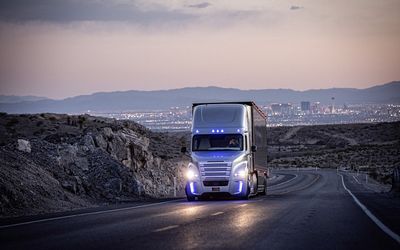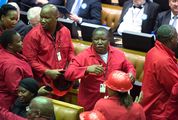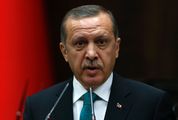Source:

Labat: Trucking in funds to keep the pack pressing ahead
by Larry Claasen,
2016-03-09 12:27:59.0
LABAT Africa is unrecognisable as the cash shell it once was, only a few years ago.
The empowerment investment group not only expects to report "substantially improved" results for the year to end February, it has also seen its share price, which had dropped as low as 8c over the past year, rocket to its current price of R1.40.
Labat ascribes its changing fortunes to the contribution coming from its newly acquired specialist transport business, Reinhardt Transport Group (RTG), for R645m in August.
RTG is a solid business. It is expected to boost Labat’s revenue from R12m to R1.5bn and to catapult operating profit from R1.5m to R209m.
Labat has since deepened its holding in the transport sector. In December it announced it was buying Elf Trans for R45m and Transmac Trucking for R50m. The group said before the latest acquisitions that it was looking to make about five — one a year over the next five years.
Labat has been able to pull off these deals because it has access to financial support from New York-based alternative investment group Global Emerging Markets (GEM), which has US$3.4bn in funding. According to Labat’s latest annual report, GEM has made $100m available to help it "fund future acquisitions and suitable transactions".
Its prospects look really solid, but it was not always this way. Labat, which is run by former rugby boss Brian van Rooyen, had basically run out of options as it struggled to find a use for its major asset, Sames (South African Micro Electronic Systems), SA’s only silicon chip manufacturing facility.
In its day, the ultra clean production facilities owned by Sames were considered world class. But it could never really compete with rival facilities in the Far East.
With few options left, in 2010 Labat became the reverse listings vehicle for mining group Aurora Empowerment Systems, which was run by President Jacob Zuma’s nephew Khulubuse Zuma and former president Nelson Mandela’s grandson Zondwa Mandela. This takeover did not work out and a follow-up plan to turn the Sames facility into a pharmaceutical manufacturing plant also fell flat. The facility has since closed, production was moved to China and the property (in Pretoria) was sold for R18.8m.
It would have been easy for the board to just shut up shop and move on. But the empowerment group has been around for 20 years, and Van Rooyen — an unflinching fighter who did not think twice about going head-to-head with rugby supremo Louis Luyt — was not going to give in just yet.
The deal with Aurora might not have worked out, but it got Van Rooyen in touch with GEM, which at the time was looking to back it. Van Rooyen not only managed to keep GEM interested in Labat, he also got it to fund its acquisitions.
This access to funding is clearly a game changer for Labat. It also makes valuing the group tricky. According to Labat, with the pro forma inclusion of RTG’s numbers, it should have a PE of about 7.75, an ROI of 14.58% and an NAV of 78.89c/share.
This is a notable turnaround, considering that without RTG its NAV is -83c. The group is clearly on the up, but with $100m in the kitty, and knowing its prospects can still rise, it is hard to determine its value.
GEM invests in countries like Brazil and Turkey that have been downgraded to "junk" status. Considering there is a danger SA could lose its investment grade, this is a plus, as many global funds rules preclude them from having holdings in countries that have been demoted to a non-investment grade.
Though valuing the group on its upside is difficult, given that it has a secure form of funding and has some solid business in its fold, at R1.40 and a PE of under 8 it looks like a buy for investors even after its share price has already rocketed.

Picture: QUICKPIC
LABAT Africa is unrecognisable as the cash shell it once was, only a few years ago.
The empowerment investment group not only expects to report "substantially improved" results for the year to end February, it has also seen its share price, which had dropped as low as 8c over the past year, rocket to its current price of R1.40.
Labat ascribes its changing fortunes to the contribution coming from its newly acquired specialist transport business, Reinhardt Transport Group (RTG), for R645m in August.
RTG is a solid business. It is expected to boost Labat’s revenue from R12m to R1.5bn and to catapult operating profit from R1.5m to R209m.
Labat has since deepened its holding in the transport sector. In December it announced it was buying Elf Trans for R45m and Transmac Trucking for R50m. The group said before the latest acquisitions that it was looking to make about five — one a year over the next five years.
Labat has been able to pull off these deals because it has access to financial support from New York-based alternative investment group Global Emerging Markets (GEM), which has US$3.4bn in funding. According to Labat’s latest annual report, GEM has made $100m available to help it "fund future acquisitions and suitable transactions".
Its prospects look really solid, but it was not always this way. Labat, which is run by former rugby boss Brian van Rooyen, had basically run out of options as it struggled to find a use for its major asset, Sames (South African Micro Electronic Systems), SA’s only silicon chip manufacturing facility.
In its day, the ultra clean production facilities owned by Sames were considered world class. But it could never really compete with rival facilities in the Far East.
With few options left, in 2010 Labat became the reverse listings vehicle for mining group Aurora Empowerment Systems, which was run by President Jacob Zuma’s nephew Khulubuse Zuma and former president Nelson Mandela’s grandson Zondwa Mandela. This takeover did not work out and a follow-up plan to turn the Sames facility into a pharmaceutical manufacturing plant also fell flat. The facility has since closed, production was moved to China and the property (in Pretoria) was sold for R18.8m.
It would have been easy for the board to just shut up shop and move on. But the empowerment group has been around for 20 years, and Van Rooyen — an unflinching fighter who did not think twice about going head-to-head with rugby supremo Louis Luyt — was not going to give in just yet.
The deal with Aurora might not have worked out, but it got Van Rooyen in touch with GEM, which at the time was looking to back it. Van Rooyen not only managed to keep GEM interested in Labat, he also got it to fund its acquisitions.
This access to funding is clearly a game changer for Labat. It also makes valuing the group tricky. According to Labat, with the pro forma inclusion of RTG’s numbers, it should have a PE of about 7.75, an ROI of 14.58% and an NAV of 78.89c/share.
This is a notable turnaround, considering that without RTG its NAV is -83c. The group is clearly on the up, but with $100m in the kitty, and knowing its prospects can still rise, it is hard to determine its value.
GEM invests in countries like Brazil and Turkey that have been downgraded to "junk" status. Considering there is a danger SA could lose its investment grade, this is a plus, as many global funds rules preclude them from having holdings in countries that have been demoted to a non-investment grade.
Though valuing the group on its upside is difficult, given that it has a secure form of funding and has some solid business in its fold, at R1.40 and a PE of under 8 it looks like a buy for investors even after its share price has already rocketed.






















Change: 1.19%
Change: 1.36%
Change: 2.19%
Change: 1.49%
Change: -0.77%
Data supplied by Profile Data
Change: -0.19%
Change: 0.69%
Change: 1.19%
Change: 0.00%
Change: 0.44%
Data supplied by Profile Data
Change: 0.62%
Change: 0.61%
Change: 0.23%
Change: 0.52%
Change: 0.12%
Data supplied by Profile Data
Change: -0.21%
Change: -1.22%
Change: -0.69%
Change: -0.51%
Change: 0.07%
Data supplied by Profile Data